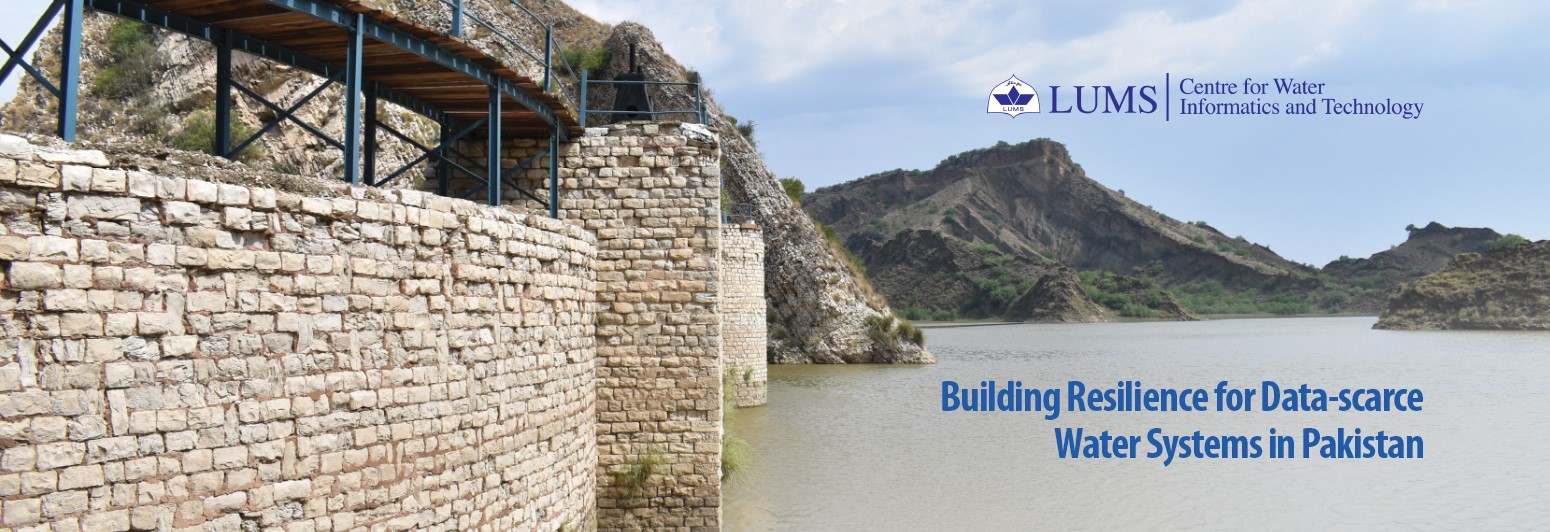Building Resilience for Data-scarce Water Systems in Pakistan

The Centre for Water Informatics and Technology (WIT), is organizing a workshop on Building Resilience for Data-scarce Water Systems in Pakistan on July 7, 2023. The workshop aims to showcase innovative research that addresses the pressing challenges related to local water systems compounded with limitations on data availability. Such limitations are a major hindrance to effective water resource management. The workshop will provide a platform for knowledge exchange, collaboration, and informed discussions, that aim to expose the participants to innovative methods to deal with the challenge of data scarcity in local water systems. Such exposure is essential to pave the way for evidence-based decision-making, sustainable water management practices, and inclusive policies.
The workshop is planned as a series of talks across a half-day event. We invite researchers and practitioners working in this area to participate in the workshop.
Workshop Organizers
- Talha Manzoor Assistant Professor of Research, Center for Water Informatics & Technology (WIT), LUMS.
- Malik Jahan Khan Visiting Associate Professor of Computer Science, LUMS.
- Shabeh ul Hasson Interim Professor of Terrestrial Remote Sensing, Universität Hamburg, Germany.
- Usman Ali Assistant Professor of Electrical Engineering, SEECS, NUST.
Details and Participation
Date: July 07, 2023
Venue: CS Smart Room, Ground Floor, SBASSE Building, LUMS
Registration: To apply for participation in the conference, please fill out the registration form at the link below. Please note that only a limited number of individuals can be accommodated in the workshop. Participation will be confirmed only after acknowledgment from the workshop organizers. Registration will continue till 12:00 noon on Thursday, July 06, 2023 (or until the seats are full).
Registration link: click here.
Workshop Highlights
Schedule
Time | Speaker | Title | Handouts or Slides |
|---|---|---|---|
| 8:30 AM - 8:45 AM | Registration | ||
| 8:50 AM - 9:00 AM | Opening Remarks | ||
| 9:00 AM - 9:20 AM | Talha Manzoor Assistant Professor, Centre for Water Informatics, LUMS. | Deploying Hydrometric Sensor Networks in Unstructured Catchments: Lessons from Namal Valley | [Slides] |
| 9:25 AM - 9:45 AM | Muhammad Siddique Akbar Assistant Professor of Sociology, Institute of Social and Cultural Studies, University of the Punjab. | From Crisis to Resilience: Learning from Experiences of Flood Survivors in Pakistan | [Slides] |
| 9:50 AM - 10:10 AM | Amjad Masood Senior Scientific Officer, Water Resources and Glaciology, Global Climate-Change Impact Studies Centre (GCISC), Islamabad | Water Security in a Changing Climate: Catalyzing Resilience in Pakistan's Data-Scarce Systems | [Slides] |
| 10:15 AM - 10:35 AM | Shabeh Ul Hasson Interim Professor of Terrestrial Remote Sensing, Universität Hamburg, Germany. | Attributing Jhelum Streamflow Changes to Climate Change | [Slides] |
| 10:35 AM - 10:55 AM | Tea break | ||
| 11:00 AM - 11:20 AM | Hassaan Furqan Khan (online) Assistant Professor of Environmental Science, Habib University. | Using mixed-methods approaches to estimate household water demands in water-stressed cities | N/A |
| 11:25 AM - 11:45 AM | Amir Zahoor Assistant Professor of Electrical Engineering, FAST National University, Faisalabad. | Remotewell: An AgriTech Solution for Digitalization of Groundwater Extraction | [Slides] |
| 11:50 AM - 12:10 PM | Jehanzeb Masud Cheema International Researcher - Water Resources Management, International Water Management Institute (IWMI). | Water accounting for efficient water resources management | [Slides] |
| 12:15 PM - 12:35 PM | Syed Muhammad Abbas Co-founder and CEO, HawkEye Pakistan. | Advanced Robotics for Sustainable Management of Water Resources | N/A |
| 12:40 PM - 1:00 PM | Malik Jahan Khan Associate Professor, Department of Computer Science, LUMS. | Prediction of Extreme Climate Conditions in Namal Valley using Machine Learning | [Slides] |
| 1:00 PM - 1:15 PM | Closing Ceremony |

